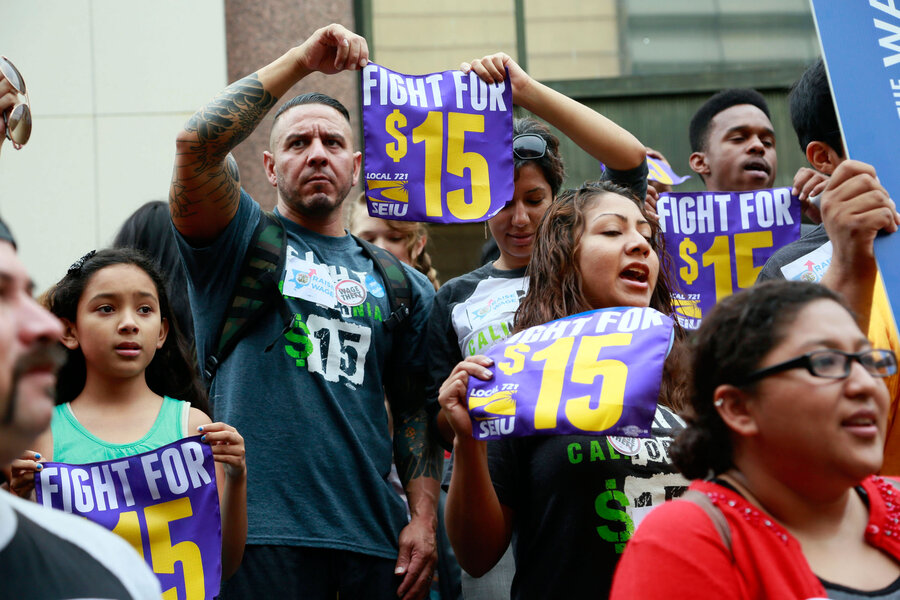California moves closer to $15 minimum wage: Why that matters
Loading...
California could have a $15-an-hour statewide minimum wage, the largest statewide minimum wage by far, by 2022, but only if state lawmakers and labor unions can get the tentative deal through the legislature, a state senator has said.
Increasing the minimum wage has become a pressing issue around the United States, but so far only a patchwork of cities and states have passed laws raising minimum wages above the federal minimum of $7.25 an hour. Washington, D.C., currently has the highest minimum wage at $10.50 an hour, with California itself only just behind at $10.
Growing income inequality in the US has helped make the "Fight for $15" movement a national issue, with a financially stretched middle class sympathizing with low-wage employees like fast food workers, who have become the poster children for the movement.
California's $5 statewide increase would be staggered over six years, according to the Los Angeles Times, which first reported the deal. Businesses with fewer than 25 employees would have an extra year, until 2023, to comply.
But state Sen. Mark Leno (D) of San Francisco, who saw a bill to raise the minimum wage stall last year, stressed that the legislature will still have to approve the increase.
"This is not a done deal," he told the Associated Press on Saturday. "Everyone's been operating in good faith and we hope to get it through the Legislature."
If the minimum wage increase does stall again in the legislature, it could get implemented via a ballot measure. One union-backed initiative – which would raise the minimum wage to $15 an hour by 2021 – has already qualified for the ballot, and a second – which would reach the $15 mark even earlier, by 2020 – is also trying to qualify.
Businesses and Gov. Jerry Brown (D) have said such a steep, rapid increase would be incredibly costly, but union leaders have said they would not immediately drop planned ballot measures, even if the legislature approves an increase.
"We want to be certain of what all this is," Sean Wherley, a spokesman for SEIU-United Healthcare Workers West, told AP.
The SEIU parent union has been involved in negotiations with state legislators, he confirmed.
"If some agreement is signed into law, then our executive board would decide what to do," he added. "They would only make that decision after any agreement is signed into law."
If California does approve a hike to $15, it would have by far the highest statewide minimum wage in the nation – if other states don't raise the plateau even higher by 2022.
Some states, including Republican-leaning Alaska and South Dakota, have voted to raise the minimum wage above the federal $7.50 minimum, and some cities including Seattle (and Los Angeles and San Francisco, in California) have passed $15-an-hour increases.
But there remains opposition to raising the minimum wage. Some studies suggest it would hurt low-wage workers more than it helps them by triggering layoffs. Republicans in Congress have made similar arguments in blocking recent efforts to raise the federal minimum wage.
The overarching argument is that a uniform statewide increase could benefit some parts of a state while harming others. The centrist think tank Third Way argued in a February report that given how the cost of living varies from place to place, flat raise hikes would "either excessively raise employer hiring costs to a point leading to unnecessary job losses, or leave workers in high-cost areas unable to afford a basic standard of living."
A law passed this month in Oregon seeks to address that issue, slowly raising the minimum wage for six years along three tiers: to $14.75 an hour in urban areas, $13.50 in smaller cities, and $12.50.
Similar policies around the country, Third Way wrote in its report, "would ensure that a cashier in Manhattan is essentially earning the same minimum wage in real terms as a cashier in Carbondale, Ill., and largely addresses fears that a big city minimum wage would destroy jobs in low-cost small towns."
Material from the Associated Press was used in this report.






